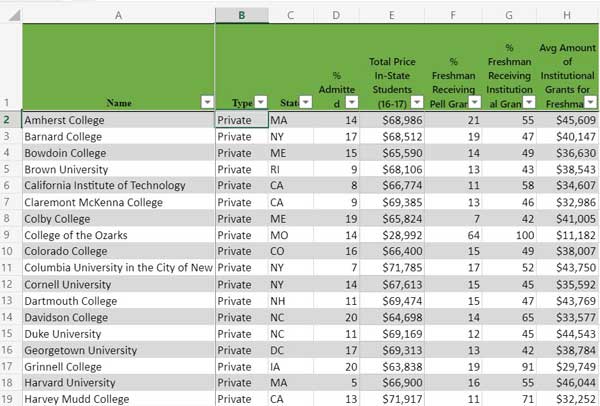 Why am I asking the question? It started with a college list. I decided to create a list of colleges that have an acceptance rate of 20% or lower. The idea is that I would use it as a sample for other lists I’m creating and hoping to sell. See, most students won’t get into the most competitive schools so I’m not really losing anything by giving away such a list. A total of 43 schools made the list.
Why am I asking the question? It started with a college list. I decided to create a list of colleges that have an acceptance rate of 20% or lower. The idea is that I would use it as a sample for other lists I’m creating and hoping to sell. See, most students won’t get into the most competitive schools so I’m not really losing anything by giving away such a list. A total of 43 schools made the list.
But then I read Admissions Confidential, The Process Can Make a Fool or Liar Out of Anyone by Jason England in the Chronicle of Higher Education. It’s behind a paywall so you won’t be able to read unless you have a subscription. In the article, England makes the case that “My three years in the admissions process made it depressingly clear that it exists chiefly to replicate the elite, privileged class of society.”
Indicators of Wealth
If you’re in any way involved in college admissions, you already know the arguments. The SAT and ACT may predict first year grades and retention but wealth predicts SAT and ACT scores. Early decision benefits those who don’t have to worry about financial aid. The wealthy can afford private counselors.
There was a new one that I haven’t seen mentioned before about elite private high schools.
Elite private high schools believe (and make a convincing case) that the middle of their classes are better than the top of most public-school classes. Our decisions spoke loudly in agreement. This is a racket that should inspire the vast majority of white people who can’t afford to send their children to private school to raise hell.
Basically, England argues that a lot of kids get into these schools because of money but they think it’s only because of their merit. Furthermore, nobody really wants to talk about this unfair advantage. Instead, we would rather talk about how affirmative action is keeping deserving white kids from their place in the nation’s most prestigious schools.
Obviously Smart Kids Can Pay Full Price
Now I’ve known for a while that these colleges must have a disproportionately high percentage of wealthy students in their classes from working with data from the Integrated Postsecondary Education Data System (IPEDS). These schools generally meet 100% of need and provide little to no merit aid. This means that the average amount of institutional aid freshman receive is high, over $30,000. But the percentage of freshman who receive it is lower than average.
After reading the article, I went back and took a closer look at the 43 schools in the list. The percentage of freshman receiving institutional aid was less than 65% at all but five of the schools. Two of the five are military academies which don’t have “normal” financial aid statistics. The average percentage of freshman receiving institutional aid at private colleges is around 87%. At two-thirds of all private colleges, 90% or more of freshman receive institutional aid.
Like I said, the lower percentages make sense because most of these colleges don’t provide a lot of merit aid. They are only meeting need. But now stop and think about this. Even with the generous definition of need at some of these colleges, 40% to 50% of freshman aren’t receiving any institutional grants. That means that basically these students don’t qualify for need based aid and are expected to pay the full cost of attendance–at schools that start at $60,000 a year. Could 40%-50% of the people you know pay for Yale out-of-pocket?
The fact that a lot of rich kid go to these schools isn’t really surprising. We’re starting to see more reports in the media of the wealth divide–just do a web search.
The thing is that we don’t want to seem to take the logical next step, that this is an unfair advantage. This is what England is getting at in his article. Everyone who goes to these schools believes that it’s strictly because of merit–they deserved to go.
Well then, that would mean that the wealthy are producing smarter kids wouldn’t it? That would explain why most of these schools have such low percentages of freshman receiving Pell Grants. At 34 of the schools, 20% or fewer of freshman receive Pell Grants. At four it’s 10% or less.
Public Schools Like Full-Pay Students Too
Apparently, these schools just can’t find enough poor kids who meet their rigorous standards. It would be nice to point to the “Public Ivies” and say that obviously you can find smart poor students since they have a much higher percentage of Pell Grant recipients in their freshman classes.
Unfortunately, they don’t. Of the seven original public ivies that aren’t among the 43 on the list, the highest percentage of freshman receiving Pell Grants is only 24%. Two of the schools actually fall in the 10% or below category. Even if you include the “runner up” schools, you only have one school where the percentage of Pell Grants is over 30%.
Based on the student selection by these schools, why wouldn’t you believe the rich have smarter kids? After all, we assume that these schools, especially the public ones, are admitting only on merit.
But that’s what England is arguing, merit can and is bought. The kids at Princeton aren’t necessarily smarter, they’re just richer. Yet, because we are happy to focus on merit without considering its source, we can have students from the top 1% outnumbering the students from bottom 60% at Dartmouth, Princeton, Yale, University of Pennsylvania, and Brown.
And this is considered fair? So much for education being the great equalizer. Sorry kid, you don’t deserve get into Yale because your parents didn’t pay for it.



